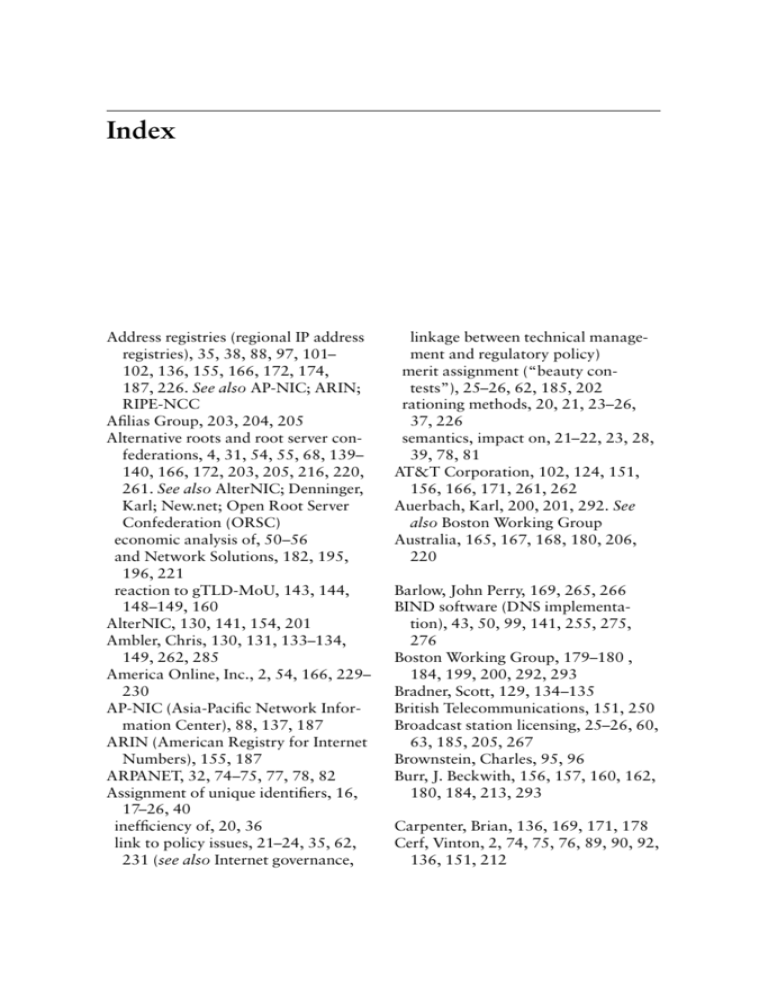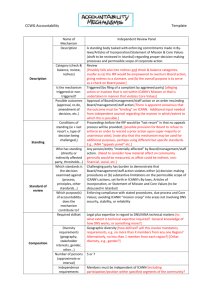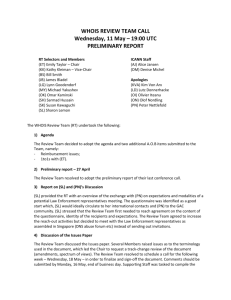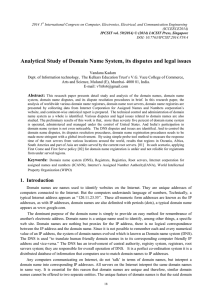Address registries (regional IP address registries
advertisement

Index Address registries (regional IP address registries), 35, 38, 88, 97, 101– 102, 136, 155, 166, 172, 174, 187, 226. See also AP-NIC; ARIN; RIPE-NCC Afilias Group, 203, 204, 205 Alternative roots and root server confederations, 4, 31, 54, 55, 68, 139– 140, 166, 172, 203, 205, 216, 220, 261. See also AlterNIC; Denninger, Karl; New.net; Open Root Server Confederation (ORSC) economic analysis of, 50–56 and Network Solutions, 182, 195, 196, 221 reaction to gTLD-MoU, 143, 144, 148–149, 160 AlterNIC, 130, 141, 154, 201 Ambler, Chris, 130, 131, 133–134, 149, 262, 285 America Online, Inc., 2, 54, 166, 229– 230 AP-NIC (Asia-Pacific Network Information Center), 88, 137, 187 ARIN (American Registry for Internet Numbers), 155, 187 ARPANET, 32, 74–75, 77, 78, 82 Assignment of unique identifiers, 16, 17–26, 40 inefficiency of, 20, 36 link to policy issues, 21–24, 35, 62, 231 (see also Internet governance, linkage between technical management and regulatory policy) merit assignment (“beauty contests”), 25–26, 62, 185, 202 rationing methods, 20, 21, 23–26, 37, 226 semantics, impact on, 21–22, 23, 28, 39, 78, 81 AT&T Corporation, 102, 124, 151, 156, 166, 171, 261, 262 Auerbach, Karl, 200, 201, 292. See also Boston Working Group Australia, 165, 167, 168, 180, 206, 220 Barlow, John Perry, 169, 265, 266 BIND software (DNS implementation), 43, 50, 99, 141, 255, 275, 276 Boston Working Group, 179–180 , 184, 199, 200, 292, 293 Bradner, Scott, 129, 134–135 British Telecommunications, 151, 250 Broadcast station licensing, 25–26, 60, 63, 185, 205, 267 Brownstein, Charles, 95, 96 Burr, J. Beckwith, 156, 157, 160, 162, 180, 184, 213, 293 Carpenter, Brian, 136, 169, 171, 178 Cerf, Vinton, 2, 74, 75, 76, 89, 90, 92, 136, 151, 212 312 Index Cerf, Vinton (cont.) role in forming Internet Society, 94– 95, 97 role in White Paper/ICANN formation, 169, 195 Chapin, Lyman, 95, 201 China, People’s Republic of, 9, 54, 55, 298 Clark, David, 76, 77, 89, 90, 91 Cochetti, Roger, 180, 290, 298 Collective action, 58, 59, 163, 1813, 197, 214, 221–222, 230 among nation-states, 4, 66, 170, 217 Commercial Internet Exchange (CIX), 138, 141, 167 Common pool resources, 57, 63–64, 116, 130, 267 domain name space as, 67, 68, 112– 114, 130–134 Computer Professionals for Social Responsibility, 150, 167 Conrad, David, 137, 288 Consensus decision making, 3, 66, 91, 94, 145, 153, 172, 175, 177, 183, 184 critique of, 215–217 in ICANN processes, 93, 200, 202, 212, 213 CORE (Council of Registrars), 145, 147, 159, 161, 165, 167, 175, 183, 203, 204, 290 Corporation for National Research Initiatives, 2, 18, 74, 92 Country code registries (ccTLDs), 167, 172, 176, 189, 196, 207, 225–226, 263 Country code top-level domain delegations, 88–89, 125–127, 205–208, 223, 244 Crocker, David, 143, 159 Crocker, Steve, 32, 74, 75, 89, 97 Denninger, Karl, 129, 130, 133, 139, 205 Developing countries, role in Internet governance, 111, 172, 244 DNS protocol, technical description, 41–48 Domain name registration commercial market for, 8, 102, 105, 110–112, 113–114, 116 growth of, 108–112, 114, 189 Domain Name Rights Coalition, 119, 149, 167, 175 Domain Name Supporting Organization (of ICANN), 170, 186, 187, 193, 194, 198, 202, 207, 226, 233 Domain name, trademark conflicts, 9, 67, 68, 105, 115–124, 172, 189, 230. See also Intellectual property interests; International Trademark Association (INTA); Trademark protection; Uniform Dispute Resolution Policy (of ICANN) Dyson, Esther, 7, 180, 184, 212, 213 Education and research networking, 83, 84, 86, 88, 166 Endowment (technological), 58, 61, 63, 255, 276 of the DNS name space and root, 59, 67, 105, 106–112 Ethernet addresses (EUI and OUI), 18, 20, 21, 24, 27–29 European Commission, 150, 165, 167, 168, 174, 176, 180, 183, 187, 205, 220, 221, 244 Farber, David, 86, 171 Federal Networking Council (U.S. government), 99–100, 101, 136, 137, 140 advisory committee, 99, 140, 170 Federal Research Internet Coordinating Committee (FRICC), 92–93, 99 First Amendment to the U.S. Constitution. See Freedom of expression First come, first served principle, 24 in domain name assignment, 88, 115, 117, 181, 261 in IP address assignment, 36–37 Index Frankel, Tamar, 3, 175, 177, 184 Freedom of expression, 9, 21–22, 119, 150, 153, 183, 234, 236, 240, 242 and DNS protocol, 245–246, 252– 253 and new TLDs, 9, 203–204 role of civil liberties groups in Internet governance, 149–150, 167, 172 Germany, 111, 166 Global Internet Project (GIP), 166, 168–169, 171, 174, 178, 179, 180, 183, 186 Governmental Advisory Committee (ICANN), 204, 205–207, 208, 219, 221, 223, 243–244, 260–261 Great Britain, 117, 206 gTLD-MoU (generic top-level domain memorandum of understanding), 142, 145–151, 154, 157, 158, 161, 165, 168, 170, 179, 181, 190, 196, 198, 201, 204, 220 Heath, Donald, 143, 146, 150, 158, 163, 291 Higgs, Simon, 129, 131, 132, 133 Hosts.txt, 40–41, 77, 78, 81 Huston, Geoff, 37, 95, 143, 171, 226 IANA (Internet Assigned Numbers Authority). See Postel, Jon, DARPA contracts for IANA functions IANA Transition Advisory Group (ITAG), 171, 176 IBM Corporation, 82, 84, 85, 124, 136, 143, 151, 156, 166, 168, 171, 203 role in ICANN formation, 169–170, 178, 180, 195 ICANN (Internet Corporation for Assigned Names and Numbers), 3, 12, 35, 55, 69, 179, 187 at-large directors election, 184, 200– 201 313 authorization of new TLDs, 43, 201– 205, 258–259 (see also New toplevel domains) budget and finances, 189, 195, 196, 203, 207–208, 225 contracts with ccTLDs, 207–208, 225–226 dominant role of management, 181, 198, 203 initial Board selection, 170, 180–181, 183–184 as international regulatory regime, 12, 212, 217–221, 222, 223, 259– 260 membership in, 177, 180, 184, 187, 198–200, 221–222 supporting organizations, 176, 183, 196, 206, 215 (see also Domain Name Supporting Organization) Information Sciences Institute, University of Southern California, 75, 77, 78, 81, 88, 92, 93, 100, 131, 184 Information Technology Association of America (ITAA), 166, 169, 170, 198 Institutional innovation, 10, 39, 59, 68, 69, 114, 226, 255 efficiency or inefficiency of institutions, 64, 256, 263 and heterogeneity of bargaining parties, 65, 69 ICANN as, 259, 266 technology as catalyst of, 58, 63 Institute of Electrical and Electronics Engineers (IEEE), 18, 26–27, 28 INTA. See International Trademark Association Intellectual property interests, political influence of, 12, 124, 138, 147, 151, 166, 174, 186, 198, 202, 220, 233 Inter-agency Working Group (U.S. government), 155, 156–158, 160 International Ad Hoc Committee (IAHC), 142–146, 148, 155, 157, 158, 171 314 Index International Forum on the White Paper (IFWP), 1–5, 175–181, 198, 292 International governmental organizations, 4, 59, 66–67, 147, 186, 220, 221, 243 special protection of names, 238, 239–240 in the White Paper, 205–206 International regimes, 59, 66–67, 212, 223 and private sector actors, 217–218 International Standardization Organization (ISO), 80, 83 International Telecommunication Union, 4, 18, 80, 82, 95, 138, 166, 170–171, 172, 267, 187 role in gTLD-MoU, 142–146, 151, 157 International Trademark Association (INTA), 124, 139, 142, 166, 234, 237, 241 Internationalized domain names, 224– 225 Internet Architecture Board, 90, 110, 134–135, 142, 224 incorporation into Internet Society, 95–96 role in IAHC and gTLD-MoU, 142– 143, 145, 147 role in White Paper drafting and ICANN formation, 166, 169, 171, 173, 174, 178, 183 “Internet community” as normative reference group, 3, 91, 137, 145, 163–164, 183, 260 in RFC 1591, 126, 207 role of IETF hierarchy in, 73, 147, 163, 166 Internet Corporation for Assigned Names and Numbers. See ICANN Internet Engineering Task Force (IETF), 90–93, 98, 99, 103, 163 governance method as model for ICANN, 212–213, 214, 215–216 relationship to Internet Society, 96– 97, 134–135 RFCs, 32, 81, 93–94, 213 role in Internet governance politics, 147, 177–178, 224 Internet governance debate over meaning of term, 7–10, 211 federalism and, 213–215 as institutionalization of name and number resources, 58 linkage between technical management and regulatory policy, 8–10, 87–88, 103, 212, 218, 222, 231, 234 Internet Society, 2, 4, 86, 96–97, 198, 204, 212 as claimant for control of the root, 129–130, 134–137, 161, 171 origins, 94–96 as participant in IAHC and gTLDMoU, 142–146, 147, 161, 165 as participant in White Paper process, 166, 173, 174, 175, 176, 183, 220 InterNIC, 100–102, 111, 112, 113, 128, 137, 142 IP addresses, 32–37, 76–77 economic aspects of assignment of, 8, 21, 35, 36, 37–38, 87, 96, 226 IPv6 and, 20, 38–39, 135, 226 relationship to DNS, 6, 32, 45 ISO-3166 standard (country codes), 43, 79, 126, 206, 238, 243 Johnson, David, 212–217, 220 Kahin, Brian, 156, 160, 279 Kahn, Robert, 2, 74, 75–76, 89, 90, 92, 95 Karrenberg, Daniel, 137, 150 Kashpureff, Eugene, 130, 131, 154 Kleiman, Kathryn, 149, 175 Klensin, John, 79, 125, 126, 169, 171, 298 Landweber, Lawrence, 86, 95, 97, 136, 143 Index Lessig, Lawrence, 4, 178, 201, 232 Libecap, Gary, 12, 58, 65, 259 Magaziner, Ira, 156, 159, 160, 161, 162, 171, 212, 213 role in ICANN incorporation, 180, 182, 183, 184 role in IFWP, 3, 4, 179 Maher, David, 138–139, 143 MCI Telecommunications (MCI WorldCom), 2, 119, 143, 151, 156, 166 participation in NSFNET, 85, 170 role in ICANN formation, 168, 169, 170, 195 Melbourne IT, 151, 203, 204 Merit Networks, Inc., 85, 170 Microsoft Corp., 54, 107 Mockapetris, Paul, 75, 78, 105 Msggroup email list, 78, 80, 81 Mueller-Maguhn, Andy, 200, 201 Name exclusions from DNS database, 192, 194, 232–233, 239–240, 250, 259, 298–299 of famous trademarks, 174, 191, 192, 232, 234 Namedroppers email list, 78, 81 Name.space (Paul Garrin), 55, 152– 153, 154, 158, 201 National Aeronautics and Space Administration (NASA), 84, 92, 99, 156, 162 National Science Foundation, 2, 84, 92, 95, 99 acceptable use policy, 86, 87, 103, 106 decision to authorize fees for domain names, 102, 105, 110–111, 128 InterNIC cooperative agreement, 100–102, 110, 111, 153–155 NSFNET backbone, 85–87, 106, 170 role in privatization of DNS, 137, 138, 140, 143, 154–156 Network externalities (network effects), 52–53 critical mass, 53, 83, 86, 182 315 and DNS root, 52–53, 216, 220 Network Solutions, Inc. (Verisign), 2, 50, 69, 173, 194–196, 203, 204, 225, 258, 262 antitrust challenge to, 152–153 claim to ownership of .com, .net, .org, 148, 155, 182, 195–196, 260 domain name dispute resolution policy, 116, 120–122, 123–124, 127 and the gTLD-MoU, 143, 146, 147– 148, 160 host of A root server, 2, 161, 182, 196 regulation of, 168, 183, 185, 186– 190, 196 Neustar, 203, 204 New top-level domains, 43, 68, 127– 130, 173, 193, 201–205, 257, 262 artificial scarcity of, 63, 185, 202, 234, 255–259, 267 draft-postel, 128–130, 131, 136, 138–140, 141, 144, 258 newdom email list, 127–128, 131, 134, 144, 201, 205 trademark protection and, 193–194, 233 .web TLD, 132, 133, 148–149, 260, 261, 262 New.net, 54, 55 New Zealand, 123, 283 Nominet UK, 111 North, Douglass C., 64, 255, 256, 257, 259 Open Root Server Confederation (ORSC), 55, 180, 184 Ostrom, Elinor, 12, 57, 58, 277 Patrick, John, 169, 195 Personality rights and DNS, 241–243 Post, David, 5, 7, 213–214 Postel, Jon, 3, 74–75, 82, 89, 90, 97, 100, 103, 110, 164, 212, 253 as assignment authority for ARPAInternet, 76–7 as assignment authority for ccTLDs, 88–89, 125–127, 206, 225, 243 316 Index Postel, Jon (cont.) attempts to privatize IANA, 135, 141, 142, 146, 160 authority over the root, 141, 152– 153, 158–159, 161 DARPA contracts for IANA functions, 81, 93, 98, 137, 155, 156, 161 role in developing DNS protocol, 78– 81 role in White Paper process, 171, 177–178, 179, 180–181 root redirection, 161–162, 171 Privacy, 8–9, 191, 237–238. See also WHOIS protocol Property rights (as theoretical concept), 11, 58, 60–61, 276 contracting for (initial formation of), 58–59, 66, 69 relationship to distribution of wealth, 60, 65, 68, 266 transaction costs and, 24, 25, 61, 65 Property rights in domain names. See also Domain name trademark conflicts; Name exclusions from DNS database; Uniform Dispute Resolution Policy conflicting claims, 68, 114–129, 130–134, 142, 148, 207, 260–263 as driver of institutional change, 67– 68, 163 expansion of trademark rights, 231– 238 ICANN as definer and enforcer of, 185, 217, 218–219, 228 impact on distribution of wealth, 68, 186, 190, 237 Public resource, DNS name space as, 144, 206, 260–261, 267 Public trustee delegation, 63, 126, 144, 207, 267 Radio spectrum management, 62–63, 297 linkage of technical coordination to regulatory obligations, 62–63, 218 Register.com, 203, 204 Registrar accreditation, 188, 192, 194, 196. See also CORE; Shared Registration System Reid, Brian, 141, 162, 282 Representation in Internet governance, 173–174, 185, 197–200, 214–215, 221–222 Reverse domain name hijacking, 116, 121, 123, 192 Reynolds, Joyce, 82, 101 RIPE, RIPE-NCC, 87–88, 101, 137, 150, 161, 187, 232 Roberts, Mike, 86–87, 95, 179, 181, 286, 292 Root of the name and address space, 6–7, 42, 47–48, 214, 273 authority over, 102, 148, 152–153, 160 DNS root zone file, 47–48, 49, 51, 52, 56 as source of political power, 31, 51, 54, 218–219, 228 technical stability of, 31, 48–50 Routers and route aggregation, 33–34, 36, 96, 226 Rutkowski, Anthony M., 27, 95, 97, 144, 163, 175 St. Johns, Mike, 137, 140 Science Applications International Corporation (SAIC), 111, 148 Shared Registration System, 129, 144, 160, 183, 187, 188. See also Registrar accreditation Shaw, Robert, 138, 143, 144 Sims, Joe (Jones, Day, Reavis, and Pogue), 176, 177, 178, 179, 180, 181, 184, 187, 225 SRI International, 76, 77, 81 DDN-NIC, 77, 82, 87, 93, 98, 100, 101 Stefferud, Einar, 73, 78, 79, 80–81, 292 Switching costs, 22–24, 28, 29 Index 317 Tarjanne, Pekka, 95, 146 TCP/IP protocol suite, 6, 75–76, 84, 106 competition with OSI, 82–89, 91, 96 Telephone numbering, 17, 18, 20–21, 22, 23, 26–27, 203 Trademark protection. See also Domain name, trademark conflicts; Intellectual Property; Uniform Dispute Resolution Policy famous marks, 174, 191, 192, 232, 234 by linkage to DNS administration, 122–123, 145, 161, 168, 185, 190, 231–238 by litigation, 123–124, 242 Twomey, Paul, 168, 204, 206, 219 U.S. Department of State, 150, 156, 157, 158 U.S. Federal Bureau of Investigation (FBI), 154, 236 U.S. Federal Communications Commission, 22, 25, 156, 225 U.S. Federal Trade Commission, 195, 258 U.S. Patent and Trademark Office, 124, 156, 261 University College, London, 76, 79 Usenet newsgroups, naming methods, 84, 230 Uncapher, Keith, 75, 92 Uniform Dispute Resolution Policy (of ICANN), 80, 124, 161, 174, 191– 193, 215, 218, 238, 240, 242, 249, 263 U.S. Administrative Procedures Act, 164, 289 U.S. Congress, 159, 195, 212, 223, 266 U.S. Department of Commerce, NTIA, 156–157, 211, 219 authority over the root, 183, 186, 197, 211, 221, 223 cooperative agreement with Network Solutions, 173, 181–183, 187–189, 194–196 Green paper, 2, 157–158, 159–161, 164–165, 168, 197, 198 MoU with ICANN, 184, 187 White paper, 2–3, 4, 8, 164, 172– 175, 183, 190, 198, 205–206, 220 U.S. Department of Defense, 101, 102, 156 ARPA, DARPA, 74, 75, 84, 90, 92, 95, 137 U.S. Department of Energy, 84, 92, 99–100, 136, 156 WHOIS protocol, 190–191, 219, 235– 238 Wilkinson, Christopher, 150, 180 WITSA. See Information Technology Association of America (ITAA) World Intellectual Property Organization (WIPO), 12, 69, 124, 138, 166, 212, 226, 263 first domain name process, 188, 190– 192, 193, 220, 221, 231, 232, 236 role in gTLD-MoU, 142–143, 145, 157 role in White Paper coalition, 172, 174 second domain name process, 225, 227, 238–245, 248, 249–250 World Wide Web, 105, 107 browsers, 54, 107, 281–282 impact on domain names, 107–110 World Wide Web Consortium, 26–27, 187 Verizon, Inc., 250–251, 274 Vixie, Paul, 22, 139, 141–142, 162, 255 X.25 protocol, 82, 85 Yahoo!, Inc. 118, 245, 249


